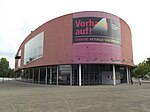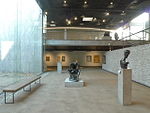Duisburg-Hochfeld Süd station
1866 establishments in PrussiaBuildings and structures in DuisburgRailway stations in Germany opened in 1866Railway stations in North Rhine-WestphaliaTransport in Duisburg

Duisburg-Hochfeld Süd station is a station with a large area of rail tracks in Duisburg in the German state of North Rhine-Westphalia. It is connected to several important railway lines. In addition, several tracks connect to Duisburg Central Station and various industrial tracks connect with the station area. It is classified by Deutsche Bahn as a category 5 station.
Excerpt from the Wikipedia article Duisburg-Hochfeld Süd station (License: CC BY-SA 3.0, Authors, Images).Duisburg-Hochfeld Süd station
Wanheimer Straße, Duisburg Wanheimerort (Duisburg-Mitte)
Geographical coordinates (GPS) Address Nearby Places Show on map
Geographical coordinates (GPS)
| Latitude | Longitude |
|---|---|
| N 51.408888888889 ° | E 6.7530555555556 ° |
Address
Duisburg-Hochfeld Süd
Wanheimer Straße
47053 Duisburg, Wanheimerort (Duisburg-Mitte)
North Rhine-Westphalia, Germany
Open on Google Maps









